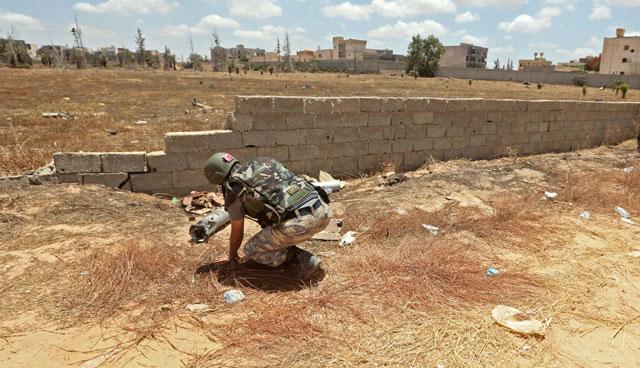- International News
- Web-2020-06-17 | 05:00 pm

He left his car some 400 metres from his house and continued on foot, anxious about booby traps hidden by retreating forces, like the one that days earlier had killed his neighbour.
Only the sound of Suleiman's footsteps broke the silence in the Tripoli outer suburb of Al Khalla, which until several weeks ago had been a battlefront for more than one year.
When Hicham reached his property, he found the garden gate blown away by a shell and the house half-destroyed, a sight he said left him heart-broken.
"It's not just because of my destroyed house, but the way the war has transformed my neighbourhood," he said.
"It's as if a huge meteorite hit it."
Oil-rich Libya has been torn by years of violence, drawing in tribal militias, terrorists and mercenaries, since the 2011 toppling and killing of longtime dictator Muammar Qadhafi in a Western-backed uprising.
The latest escalation started on April 4, 2019, when strongman Khalifa Haftar attacked Tripoli, the seat of the UN-recognised Government of National Accord (GNA).
Hundreds died and some 200,000 people were displaced by the onslaught. But then the GNA, with stepped-up support from Turkey, pushed back the would-be invaders and launched a lightening counter-offensive that has reclaimed all of northwestern Libya.
The United Nations last week voiced "horror" over reports that eight mass graves had been discovered in Tarhuna, formerly the main rear base of Haftar forces southeast of Tripoli.
Human Rights Watch called on Haftar on Tuesday "to urgently hold his forces accountable for any war crimes they are committing and apparently advertising online".
The scale of destruction is staggering in Al Khalla — a strategic crossroads south of Tripoli — but many families want their homes back nonetheless, to stop drifting from shelter to shelter.
"I put all my savings and 10 years of my life into building this house,” Hicham, the teacher, said with sorrow, as he leafed through one of the few books that had not been burned or torn apart.
He vowed to rebuild his house, telling AFP he could no longer afford to rent temporary accommodation for his family of five.
But amid the abandoned homes, a new and insidious danger lurks: anti-personnel mines and improvised explosive devices (IEDs) that have been laid in houses, gardens and along roads.
They have been hidden in kitchen pantries and toilet cisterns, under roof tiles and construction materials, often with two or three devices stacked atop one another to make de-mining almost impossible.
Libyan ordnance clearance experts have marked high-risk areas with signs and wall inscriptions, but the warnings have come too late for many.
More than 30 people have been killed and 60 injured by mines, most of them civilians, said the health ministry in Tripoli.
‘Targeting civilians’
The UN Mission in Libya on May 26 "strongly condemned” any use of anti-personnel mines against civilians and denounced the "deliberate targeting” of non-combatants.
Anti-personnel mines are banned by an international treaty, although major powers including China, Russia and the United States have not signed it.
The GNA has accused pro-Haftar forces of having "mined the houses before leaving them” and asked for international assistance to clear them.
A team of Turkish de-miners who arrived in Tripoli last week have joined the clearance effort under a broader military cooperation agreement signed late last year between the GNA and Ankara.
Pro-Haftar forces have not commented on accusations they are responsible, but unauthenticated videos on social networks have shown pro-Haftar fighters preparing explosive devices in a house in Salaheddine district.
General Ahmad Bayou, head of the explosives clearance team at the GNA interior ministry, charged that pro-Haftar forces had used various methods to conceal the mines.
The unit’s men had dismantled mines and recovered remnants of ammunition from five hectares of land.
"It is difficult to know the extent of the areas south of Tripoli where very dangerous and very new mines, of types unknown in Libya, have been laid,” Bayou said.
For the time being, the GNA has suspended the return of families to their homes in uncleared areas.
Meanwhile fighting has continued elsewhere, despite ceasefire calls by the US, EU and other foreign powers.
The resurgent GNA has vowed to push on for Sirte, the last major settlement before the traditional boundary between western Libya and Haftar’s stronghold in the east












